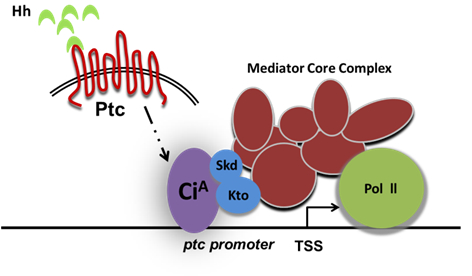
Researchers Discover New Mechanism of Kto-Skd Complex in Regulating ptc Expression Of Hedgehog Signaling Pathway
Jul 07, 2014 Email"> PrintText Size

In Drosophila melanogaster wing imaginal disc, Hedgehog (Hh) protein is synthesized and secreted by P compartment cells. Secreted Hh proteins diffuse into A compartment to form a local concentration gradient that governs a wide variety of processes during embryonic development and adult tissue homeostasis. In anterior cells at A/P boundary where Hh is present in high concentrations, full-length transcription factor Cubitus interruptus (Ci) accumulates and stimulates the transcription of the target gene patch (ptc). Although Ci is the key transcription factor of ptc, other effective transcription regulation factors remain unclear so far.
PhD students MAO Feifei and YANG Xiaofeng, led by Professor ZHAO Yun from the Institute of Biochemistry and Cell Biology, Shanghai Institutes for Biological Sciences, revealed that two mediator complex subunits, Kto and Skd, affect the A/P-axial development of the whole wing disc by regulating ptc expression through interacting with Ci in Hh signaling pathway.
Their study showed that loss of function of kto and skd causes a shift of A/P boundary to posterior compartment and increases the width of Ptc domain, while overexpression of them can downregulate the expression of ptc mainly in high levels of Hh. Further studies demonstrate that Ci interacts with Kto-Skd complex through their N-terminal parts in an Hh signaling activity dependent manner. High activity of Hh signaling could enhance this interaction. Chip assay indicates Kto and Ci can be recruited to the same promoter locus of ptc. Thus, Kto-Skd complex can regulate ptc expression by interacting with Ci.
The finding that Kto-Skd complex affects Hh pathway provides novel mechanistic insight into the regulation of A/P boundary formation in Drosophila wing discs.
The study, entitled “Kto-Skd complex can regulate ptc expression by interacting with Ci in Hedgehog signaling pathway” was published online in the Journal of Biological Chemistry on June 24, 2014. The work was supported by grants from the National Natural Science Foundation of China, the National Basic Research Program of China and Strategic Priority Research Program of the Chinese Academy of Sciences.

Kto-Skd complex can regulate ptc expression by interacting with Ci mainly in high levels of Hh. (Image by Prof. ZHAO Yun’s group)
In Drosophila melanogaster wing imaginal disc, Hedgehog (Hh) protein is synthesized and secreted by P compartment cells. Secreted Hh proteins diffuse into A compartment to form a local concentration gradient that governs a wide variety of processes during embryonic development and adult tissue homeostasis. In anterior cells at A/P boundary where Hh is present in high concentrations, full-length transcription factor Cubitus interruptus (Ci) accumulates and stimulates the transcription of the target gene patch (ptc). Although Ci is the key transcription factor of ptc, other effective transcription regulation factors remain unclear so far.
PhD students MAO Feifei and YANG Xiaofeng, led by Professor ZHAO Yun from the Institute of Biochemistry and Cell Biology, Shanghai Institutes for Biological Sciences, revealed that two mediator complex subunits, Kto and Skd, affect the A/P-axial development of the whole wing disc by regulating ptc expression through interacting with Ci in Hh signaling pathway.
Their study showed that loss of function of kto and skd causes a shift of A/P boundary to posterior compartment and increases the width of Ptc domain, while overexpression of them can downregulate the expression of ptc mainly in high levels of Hh. Further studies demonstrate that Ci interacts with Kto-Skd complex through their N-terminal parts in an Hh signaling activity dependent manner. High activity of Hh signaling could enhance this interaction. Chip assay indicates Kto and Ci can be recruited to the same promoter locus of ptc. Thus, Kto-Skd complex can regulate ptc expression by interacting with Ci.
The finding that Kto-Skd complex affects Hh pathway provides novel mechanistic insight into the regulation of A/P boundary formation in Drosophila wing discs.
The study, entitled “Kto-Skd complex can regulate ptc expression by interacting with Ci in Hedgehog signaling pathway” was published online in the Journal of Biological Chemistry on June 24, 2014. The work was supported by grants from the National Natural Science Foundation of China, the National Basic Research Program of China and Strategic Priority Research Program of the Chinese Academy of Sciences.

Kto-Skd complex can regulate ptc expression by interacting with Ci mainly in high levels of Hh. (Image by Prof. ZHAO Yun’s group)
CAS Institutes
There are 124 Institutions directly under the CAS by the end of 2012, with 104 research institutes, five universities & supporting organizations, 12 management organizations that consist of the headquarters and branches, and three other units. Moreover, there are 25 legal entities affiliated and 22 CAS invested holding enterprisesThere are 124 I...>> more
Contact Us

Chinese Academy of Sciences
Add: 52 Sanlihe Rd., Xicheng District, Beijing, China
Postcode: 100864
Tel: 86-10-68597592 (day) 86-10-68597289 (night)
Fax: 86-10-68511095 (day) 86-10-68512458 (night)
E-mail: cas_en@cas.cn

